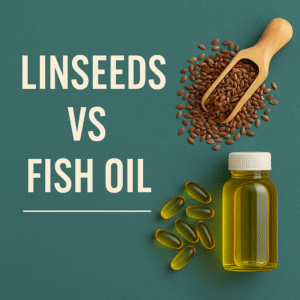Discover why linseeds aren’t the best source of omega-3 for modern bodies — and why fish oil offers far greater bioavailability for brain and hormone health.
Linseeds and Modern Nutrition
Linseeds, also known as flaxseeds, are widely promoted as a plant-based source of omega-3 fatty acids. What is rarely discussed is how difficult they are for the modern body to break down and utilise effectively. Both linseed/flax and hemp require strong liver function to convert their oils into usable forms of omega-3 — and for many people today, this can be significantly compromised as is alluded to further in this article.
By contrast, fish oil is already in its most absorbable form. It provides EPA and DHA — the active compounds of omega-3 that nourish the brain and endocrine system. These essential fatty acids help neurotransmitters communicate and support the production of serotonin, the body’s natural “feel-good” hormone. When combined with vitamins B3, B6, magnesium, and zinc, fish oil becomes vital nutrition for emotional and hormonal balance.
Why Linseeds Are Poorly Absorbed
Modern living has created a perfect storm for poor nutrient absorption. Over generations, diets high in processed foods — along with long-term use of pharmaceuticals, vaccines, antibiotics, and hormonal medications — have overburdened the liver and weakened gut health. Add chronic dehydration and fatty liver to the mix, and the conversion of omega-3 from flax into a usable form becomes far more limited.
The body must convert the alpha-linolenic acid (ALA) in flax into EPA and DHA through roughly ten enzymatic steps. When the liver is sluggish or the system depleted, this conversion simply doesn’t happen effectively. The result is that many -particularly those on vegan or highly processed diets, remain starved of these essential fatty acids.
Fish oil bypasses the liver’s complex conversion pathway. It delivers omega-3 in its bioavailable, pre-converted form, supporting brain and endocrine function directly.
Ground Linseeds and Bioavailability
Pre-ground linseeds may seem like a practical option, but they lose quality fast. Once exposed to air and light, their delicate oils oxidise and become rancid — sometimes before they even reach the consumer. Spoiled seeds not only lose nutritional value but can also create free radicals in the body. Grinding seeds freshly at home is often suggested as a better alternative, and while this does help preserve some of the oils, the same fundamental issue remains: once the seed coat is broken, oxidation begins almost immediately. Even when freshly ground, linseed oil is extremely fragile and can deteriorate within minutes if not refrigerated and used straight away — making it a very unstable and unreliable source of omega-3.
Whole linseeds can pass through the digestive system largely intact, working more as a gentle internal broom than a nutritional source. Ideally the linseeds are soaked in water and the water then drained and taken internally can help clear waste, acting as a natural laxative — helpful for cleansing, but not for omega-3 replenishment.
The Omega-3 and Omega-6 Imbalance
The body ideally needs omega-3 and omega-6 in equal measure — a ratio of roughly 1:1. Modern diets, however, often push this to 1:20 or more in favour of omega-6. This imbalance drives inflammation, fatigue, and even tumour growth. Omega-6 is found in abundance in vegetable oils, nuts, seeds, and processed foods, while omega-3 — more delicate and perishable — is often missing entirely.
Our ancestors naturally maintained this balance through traditional foods such as raw soured milk, butter, fish, and grass-fed meats — all rich in omega-3. Today, grain-fed livestock and processed fats have flipped that ratio upside down.
The Modern Consequence
Clinically, many people may show signs of essential fatty acid depletion — it’s a multi nuanced process and can be as a result of years of medication, vaccine load, nutrient-poor diets, and lifestyle stress. As a result, the cumulative burden can weaken the body’s terrain, making it harder to digest and convert plant oils. The result is low-grade inflammation, hormonal imbalance, and emotional exhaustion — a system literally running without its vital “spark plug”.
A Practical Takeaway
Soaked linseeds can be used to help cleanse the gut and gently remove toxins, but they shouldn’t be relied on for omega-3 nourishment. For genuine cellular support and mood balance, high-quality fish oil remains the superior, bioavailable choice. It replenishes the body’s true omega-3 reserves, aids serotonin production, and supports resilience against depression and anxiety.

